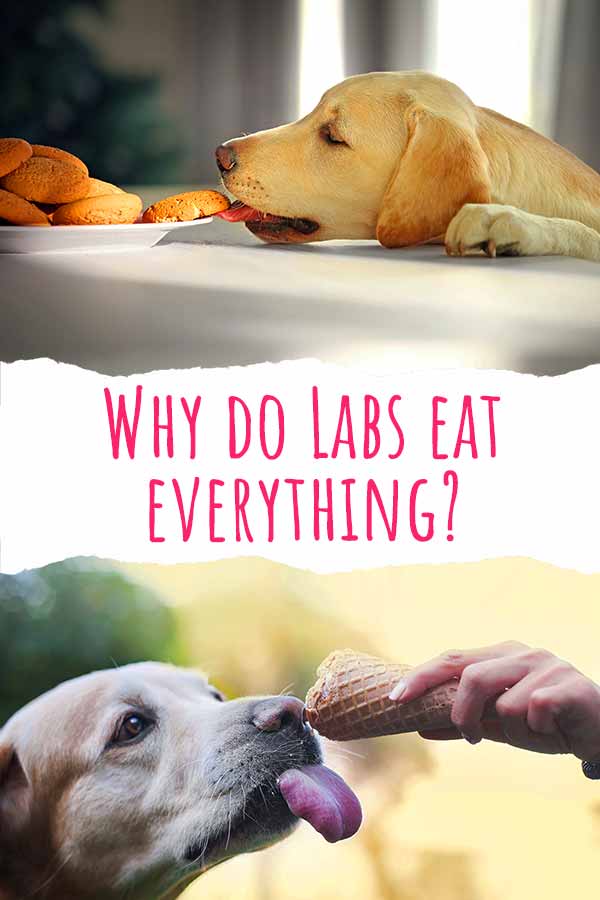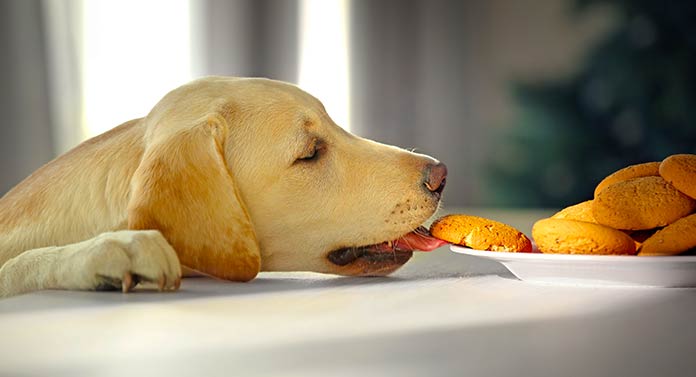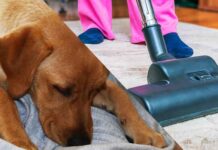The Labrador as a breed is famous for their appetite. And there is a genetic reason why many Labs are greedy. Unfortunately the Lab’s affection for eating can sometimes extend to inedible and very inappropriate items.
Almost all puppies and many young dogs, will chew up soft toys, blankets and other bedding, and anything you leave lying on the floor. Including your socks. And occasionally they’ll swallow some of the bits they pull off, usually without any ill effects.
With some dogs, they actually and deliberately eat and swallow these items. Often without chewing them very much at all. Others will eat dirt, stones, and sticks and we have an article that talks about dogs that eat dirt and trash.
When eating household items becomes a regular occurrence, it can be a serious problem.
Eating inappropriate items
You may only realise this is happening when you see your dog struggling to pass one of your favorite socks a day or two later. When these items get stuck internally you have a medical emergency on your hands.
Many years ago, I had a lovely black Labrador called Jack who constantly swallowed small items of clothing, paper, and plastic objects.

Eating inappropriate and potentially dangerous items is not at all uncommon in Labs and other retrievers. My sister’s two Labs managed to poison themselves on a walk eating mushrooms, fortunately they made a full recovery.
Another family member had a Flatcoated Retriever that consumed an entire branch of a pyracanthas bush. This prickly snack landed them with a very expensive veterinary bill.
Reasons why some Labs eat everything they can get their paws on
- Hunger
- Boredom and habit
- Stress
- Lack of nutrients
- Disease
- Genes
Is my dog hungry?
If your dog is underweight, then hunger could be what is driving them to eat a lot. But I imagine if that were the case, you would be reaching for their food bowl, and not reading this article.
Some Labs are genetically hard wired to be hungrier than most other dogs. They are less satisfied by eating and want to eat again sooner. This won’t actually make any difference to your dog’s weight if you stick to the right rations. And while it might make them more likely to raid the trash, plenty of dogs without the hungry gene like to raid the trash too. So it probably isn’t a big factor in your dog’s behavior. If you are not sure whether or not your dog is overweight, or are pretty certain they are, check out my article: Fat Labrador for help and advice on getting your dog healthy again.
Is your dog bored?
Sometimes boredom will result in dogs engaging in strange behaviors. These tend to lean more towards chewing and destroying your stuff, rather than swallowing it. But swallowing stones for example may start as a way for a bored dog to entertain themselves, and become a habit if allowed to continue.
Puppies are particularly vulnerable to developing a stone swallowing habit and I always make sure that my puppies’ outdoor play area is free from pea shingle or gravel of any sort. And that they have a selection of toys with different textures to play with.
Is your dog stressed?
Like boredom, stress can result in odd behaviors. And again these tend to manifest as chewing and destructive behavior, or soiling, rather than swallowing things. But stress could be a factor in inappropriate eating patterns for some dogs.
Stress can result from over long periods of separation, and some reactive dogs will be very prone to stress. Have a chat with your veterinarian if you think your dog may be suffering from stress
Is your dog getting a balanced diet?
In rare cases a dog may develop ‘pica’ or an appetite for unnatural substances such as dirt, because they are not getting the right nutrients in their diet. This is pretty unlikely if you feed a reputable brand of dog food as these are all tested and designed specifically to keep dogs healthy.
If you are feeding a home-made diet, check with your veterinarian to make sure it is balanced. You can find more advice here on feeding your adult Labrador and I have also written an in-depth article on feeding your puppy.
Is your dog sick?
Some health issues can be associated with disordered eating. Cushings disease is an example and can cause increased appetite. But this is a relatively rare condition affecting mainly older dogs. And there would likely be other symptoms if your dog was sick
Can eating weird things be genetic?
It does seem to me, that bizarre eating habits are more common in retrievers such as Labs, than some other breeds. I suppose it is not that surprising when we breed dogs for generations to be passionate about carrying things in their mouths, if sometimes that passion sometimes spills over into chewing and swallowing.
So in that sense, there may be a separate genetic link, in addition to the hungry gene mentioned above.
What about solutions?
If you have a dog with an inappropriate eating problem, I really feel for you, as it can be very challenging to deal with.
Veterinary insurance is important, as the odd things that these dogs swallow can cause a blockage, or can be toxic. You can’t insure after the event, and you don’t want to be worrying about how you are going to pay the veterinary fees when your dog is dangerously ill.
Outdoors, dogs that eat all manner of nasty substances may need to wear a muzzle to keep them safe. Indoors, you’ll need to be scrupulous about picking up your stuff. And use baby gates to exclude your dog from areas that you can’t keep tidy.
Don’t be too hard on yourself
If your dog makes themselves ill from swallowing something they shouldn’t, try not to blame yourself too much. It can be incredibly difficult keeping these dogs safe.
My own Lab Jack died young of an unrelated condition. But even if he had survived that, I think I would have struggled to keep him out of the veterinary hospital. Especially as I had four young children at home at the time. And I simply couldn’t be everywhere, or supervise him all the time.
Keeping a young dog permanently crated is not the answer in my view, because life in a crate is not a life. There has to be some degree of compromise.
So do your best, keep your insurance up to date, and contact your veterinarian promptly for advice if you suspect your dog has swallowed something harmful.
References and Resources
- Raffan, E. (et al), ‘A Deletion in the Canine POMC Gene is Associated with Weight Gain and Appetite in Obesity-Prone Labrador Retriever Dogs’, Cell Metabolism (2016)
The Labrador Site Founder
Pippa Mattinson is the best selling author of The Happy Puppy Handbook, the Labrador Handbook, Choosing The Perfect Puppy, and Total Recall.
She is also the founder of the Gundog Trust and the Dogsnet Online Training Program
Pippa's online training courses were launched in 2019 and you can find the latest course dates on the Dogsnet website



















